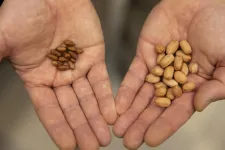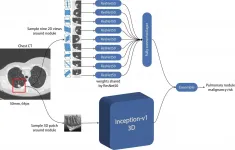Tulane researchers develop test that can detect childhood tuberculosis a year ahead
Using only a small blood sample, the test detects a protein secreted by Mycobacterium tuberculosis, which causes TB infection
2021-05-18
(Press-News.org) Researchers at Tulane University School of Medicine have developed a highly sensitive blood test that can find traces of the bacteria that causes tuberculosis (TB) in infants a year before they develop the deadly disease, according to a study published in BMC Medicine.
Using only a small blood sample, the test detects a protein secreted by Mycobacterium tuberculosis, which causes TB infection. It can screen for all forms of TB and rapidly evaluate a patient's response to treatment, said lead study author Tony Hu, PhD, Weatherhead Presidential Chair in Biotechnology Innovation at Tulane University.
"This is a breakthrough for infants with tuberculosis because we don't have this kind of screening technology to catch early infections among those youngest groups who are most likely to be undiagnosed," Hu said. "I hope this method can be pushed forward quickly to reach these children as early as possible."
Each year, nearly a million children develop TB and 205,000 die of TB-related causes. More than 80% of childhood TB deaths occur in those under the age of 5. Most of these deaths occur because their disease is undiagnosed as children with TB, particularly infants, usually have symptoms that are not specific for the disease. These children also have difficulty producing the respiratory samples used for TB detection by the best TB tests now in use.
Even when it is possible to obtain these samples from children, they tend to be less effective for diagnosis, since they often contain much less of the bacteria than samples from adults, Hu said. His test's assay, however, uses a small blood sample that can be easily obtained from children of any age to detect a specific protein (CFP-10) that the bacteria secrete to maintain the infection that develops into TB. Since this protein is present at very low levels in the blood, Hu's assay uses an antibody specific for this protein to enrich it from other proteins in blood and a mass spectrometer to detect it with high sensitivity and accuracy.
Hu and his team used this test to screen stored blood samples collected from 284 HIV-infected and 235 children without the virus who participated in a large clinical trial conducted between 2004-2008. Hu's group found their test identified children diagnosed with TB by the current gold-standard TB tests with 100% accuracy. The assay also detected 83.7% of TB cases that were missed by these tests, but that were later diagnosed by a standard checklist employing an array of other information collected by each child's physician (unconfirmed TB cases). Hu's test also detected CFP-10 in 77% of the blood samples that were collected 24 weeks before children were diagnosed with TB by other methods, indicating its strong potential for early TB diagnosis. The biomarker from some positive cases can be detected as early as 60 weeks before their TB diseases were confirmed.
The researchers are working to develop an inexpensive, portable instrument to read the test to allow it to be more easily used in resource-limited settings often encountered in areas where TB is prevalent.
INFORMATION:
The study was funded by the National Institute of Allergy and Infectious Diseases, the Eunice Kennedy Shriver National Institute of Child Health and Human Development and the U.S. Department of Defense.
ELSE PRESS RELEASES FROM THIS DATE:
2021-05-18
A new cancer vaccine could boost the positive effects of existing immunotherapy drugs, improving the success rate of treatments from 20% to 75% of cases, according to a new study by immunologists from the University of Konstanz. The vaccine, which incorporates a new immunostimulant that is safe for use in humans, was shown to partially eliminate tumours in mice. However, the study further demonstrated that combining the vaccine with an immune checkpoint inhibitor -- an established immunotherapy drug with a 20% success rate overall for patients -- can vastly ...
2021-05-18
Climate change induced yield reductions can be compensated by cultivar adaptation and global production can even be increased.
Global agriculture both is one of the major drivers of climate change and strongly affected by it. Rising temperatures are among the main reasons for yield reductions. Therefore, the agricultural sector is faced with the major challenge of adapting to climate change in order to ensure food security in the future. According to a new study carried out by international researchers, the use of locally adapted cultivars can significantly contribute to achieve this goal. The study ...
2021-05-18
(Boston)--Researchers from Boston University School of Medicine (BUSM) report the formation of human cells containing a green fluorescent protein or GFP (one of the most important proteins in biology and fluorescence imaging) genetically fused with two interferon stimulated genes (ISGs), namely Viperin and ISG15. This new creation makes these cells highly valuable reagents for reporting innate immune responses to viral infections, including those caused by coronaviruses.
These engineered cells, which turn green when treated with interferon, are highly novel because this is the first time a reporter gene (a gene ...
2021-05-18
A filter made from polymer nanothreads blew three kinds of commercial masks out of the water by capturing 99.9% of coronavirus aerosols in an experiment.
"Our work is the first study to use coronavirus aerosols for evaluating filtration efficiency of face masks and air filters," said corresponding author Yun Shen, a UC Riverside assistant professor of chemical and environmental engineering. "Previous studies have used surrogates of saline solution, polystyrene beads, and bacteriophages -- a group of viruses that infect bacteria."
The study, led by engineers at UC Riverside and The George Washington University, compared ...
2021-05-18
The wild relatives of modern peanut plants have the ability to withstand disease in ways that peanut plants can't. The genetic diversity of these wild relatives means that they can shrug off the diseases that kill farmers' peanut crops, but they also produce tiny nuts that are difficult to harvest because they burrow deep in the soil.
Consider it a genetic trade-off: During its evolution, the modern peanut lost its genetic diversity and much of the ability to fight off fungus and viruses, but gained qualities that make peanut so affordable, sustainable and tasty that people all over the world grow and eat them.
Modern peanut plants were created 5,000 to ...
2021-05-18
OAK BROOK, Ill. - An artificial intelligence (AI) program accurately predicts the risk that lung nodules detected on screening CT will become cancerous, according to a study published in the journal Radiology.
Lung cancer is the leading cause of cancer death worldwide, with an estimated 1.8 million deaths in 2020, according to the World Health Organization. Low-dose chest CT is used to screen people at a high risk of lung cancer, such as longtime smokers. It has been shown to significantly reduce lung cancer mortality, primarily by helping to detect cancers at an early stage when they are easier to treat successfully.
While lung cancer typically shows up as pulmonary nodules on CT images, most nodules are benign ...
2021-05-18
Researchers have identified specific influenza targets that could be used to better protect Indigenous people from experiencing severe influenza disease through a universal, T cell-based vaccine.
In a collaboration with Monash Biomedicine Discovery Institute, Menzies School of Health Research and CQUniversity, Peter Doherty Institute for Infection and Immunity (Doherty Institute) researchers took a deep-dive look into how the immune system can protect Aboriginal and Torres Strait Islander people from severe influenza disease.
"We know that some populations are at high risk from severe influenza, and these include Indigenous people ...
2021-05-18
Fields of opium poppies once bloomed where the Zurich Opera House underground garage now stands. Through a new analysis of archaeological seeds, researchers at the University of Basel have been able to bolster the hypothesis that prehistoric farmers throughout the Alps participated in domesticating the opium poppy.
Although known today primarily as the source of opium and opiates, the poppy is also a valuable food and medicinal plant. Its seeds can be used to make porridge and cooking oil. Unlike all other previously domesticated crops, which are assumed to ...
2021-05-18
The research team, led by Academician GUO Guangcan from University of Science and Technology of China (USTC) of the Chinese Academy of Sciences, collaborating with LI Bo from Shangrao Normal University and CHEN Jingling from Nankai University, achieved the masking of optical quantum information. The researchers concealed quantum information into non-local quantum entangled states. The study was published in the journal Physical Review Letters.
Quantum information masking as one of the new information processing protocol transfers quantum information from a single quantum carrier to the quantum entangled state between multiple carriers avoiding the information ...
2021-05-18
Fossils of land animals from South America have been found in the Antilles, but how did these animals get there? According to scientists from the CNRS, l'Université des Antilles, l'Université de Montpellier and d'Université Côte d'Azur, land emerged in this region and then disappeared beneath the waves for millions of years, explaining how some species were able to migrate to the Antilles. This study will be published in June 2021 issue in Earth-Science Reviews.
Fossils of land animals from the Antilles, including mammals and amphibians, have their closest relatives in South America. The crossing of the Caribbean Sea from South America was therefore possible, but how?
As swimming across the continent ...
LAST 30 PRESS RELEASES:
[Press-News.org] Tulane researchers develop test that can detect childhood tuberculosis a year ahead
Using only a small blood sample, the test detects a protein secreted by Mycobacterium tuberculosis, which causes TB infection




